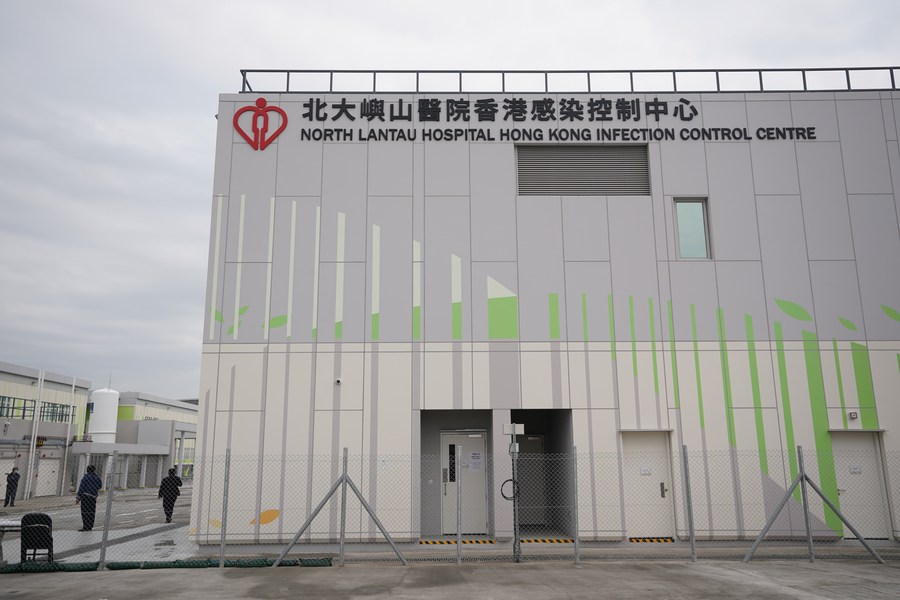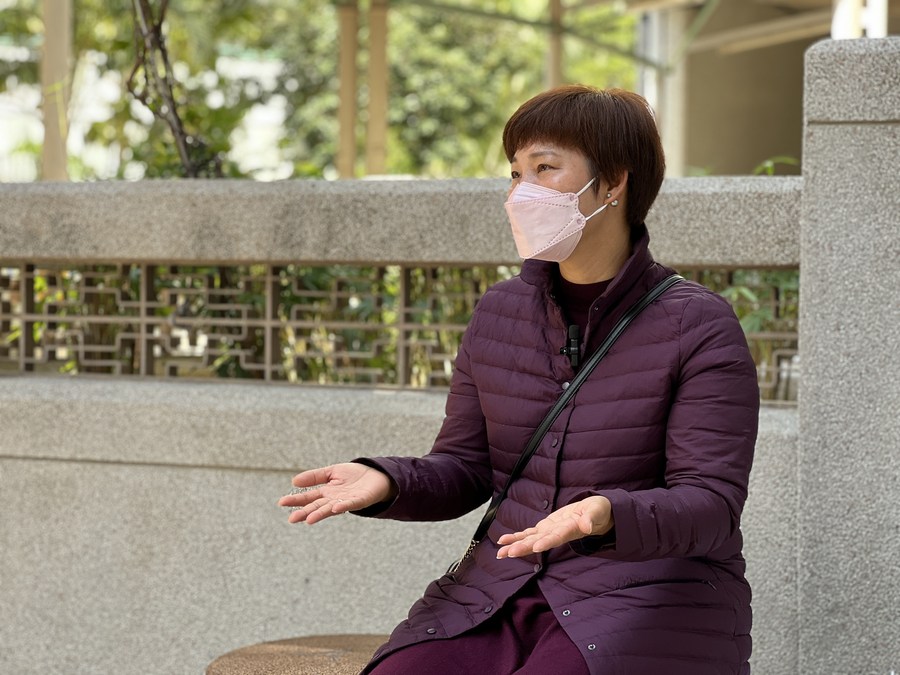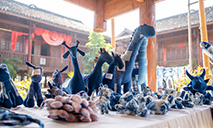A Hong Kong nursing assistant's firm belief in fighting COVID-19 pandemic

File photo taken on Feb. 25, 2021 shows the North Lantau Hospital Hong Kong Infection Control Center in Hong Kong, south China. (Xinhua/Wang Shen)
Katy Chung decided to become an "angel" this time by volunteering to work in the center receiving COVID-19 patients with her firm belief in fighting the pandemic in Hong Kong.
HONG KONG, March 16 (Xinhua) -- "I want to drink water." "When to feed me?" Calls are ringing one after another at the nurse station in North Lantau Hospital Hong Kong Infection Control Center's ward area.
The calls are from the severe COVID-19 patients in negative pressure isolation wards and they rely on the "nurses" to meet all their needs.
In Hong Kong, "nurses" refer to female caregivers, including nursing assistants, social workers, and etc.
During the epidemic, these "nurses" help to take care of COVID-19 patients, and 50-year-old Katy Chung is one of them.
Since the outbreak of the fifth wave of COVID-19 in Hong Kong, the Hong Kong Hospital Authority has deployed front-line and retired medical staff from hospitals to work in the center which receives COVID-19 patients.
Chung, from Hong Kong Buddhist Hospital, volunteered to work in the center on Jan. 6.

Nursing assistant Katy Chung speaks during an interview with Xinhua in south China's Hong Kong, Feb. 26, 2022. (Xinhua/Zhang Yue)
BOLD BUT CAUTIOUS
Negative rapid test results are Chung's "pass" to work in the center every time.
The morning shift starts from 7 a.m. local time, and Chung leaves home at 6 a.m. local time after having a nice big meal to withstand the intense work of more than nine hours.
When arriving at the ward area, Chung immediately changes into a green uniform, and then puts on a blue protective suit, a headgear, goggles, an N95 mask, a face shield and gloves to enter the negative pressure isolation wards to take patients' blood pressure, temperature, and etc.
The center is a negative pressure ward hospital that receives and provides treatment for severe COVID-19 patients. The nurses prepare everything for the patients such as water, meals, towels and sanitary napkins.
"We are very careful in every detail, because if we make a mistake, we can't come to work," said Chung, adding that a colleague forgot to wear goggles and was immediately dismissed by the supervisor.

Photo taken on Feb. 26, 2022 shows a patient's ward at the North Lantau Hospital Hong Kong Infection Control Center in Hong Kong, south China. (Xinhua)
BIG LOVE
As the pandemic worsened at the end of February in Hong Kong, the nurses' workload was multiplied as patients admitted to the center are almost all in their 80s and 90s, mostly critically ill and unable to move.
Usually, the nurses change diapers every four hours for the patients who can not go to the toilet by themselves, but the heavy workload sometimes made it impossible for them to do it timely.
"I felt sorry for the elderly because we could not meet their needs in a timely manner," Chung said. "Six or seven nurses have more than 70 patients to care for."
Fortunately, things are getting better. Chung said the "nurses' group" has grown to more than 300 people now.
On March 1, the Hong Kong Special Administrative Region government announced that it had relaxed certain rules for the care sector and was urgently recruiting temporary contract care staff from the mainland.
"The mainland has rich experiences in fighting COVID-19, and I believe nurses from the mainland are very professional," Chung said.

The latest batch of the Chinese mainland medical staff arrive in Hong Kong, south China, March 14, 2022, to support the local fight against the COVID-19 epidemic. (Xinhua/Li Gang)
FIRM BELIEF
More than a decade ago, Chung was a businesswoman. After undergoing a gynecological operation and receiving good care from medical staff during her stay in hospital, she decided to become an "angel" caring for the sick.
With efforts, Chung obtained the nursing qualification certificate later and became a nursing assistant in orthopedics department and internal medicine.
During the last 14 years, Chung has only had two Spring Festival holidays, and she spent this Spring Festival at the center.
Chung and her family had a family reunion dinner at noon on Chinese New Year's Eve, and then rushed to work.
Amid the pandemic, "Peace and Health" has become the most popular greetings for the Spring Festival, replacing "Gong Xi Fa Cai (Chinese spelling for 'wishing you prosperity')," the favorite blessings of Hong Kong residents in the past.
Chung's term of service at the center is 12 weeks. "As long as the center needs my service, I am willing to work here until the fifth wave of the epidemic is over," she said.
Photos
Related Stories
- China's education ministry stresses mental health amid epidemic
- Jilin City makes efforts to ensure sufficient supply of goods and food
- HKSAR gov't urges public not to let guard down on epidemic prevention
- Chinese vice premier calls for concrete measures to contain COVID-19 spread
- COVID-19 pandemic reveals problems in U.S. food system: The Guardian
Copyright © 2022 People's Daily Online. All Rights Reserved.










